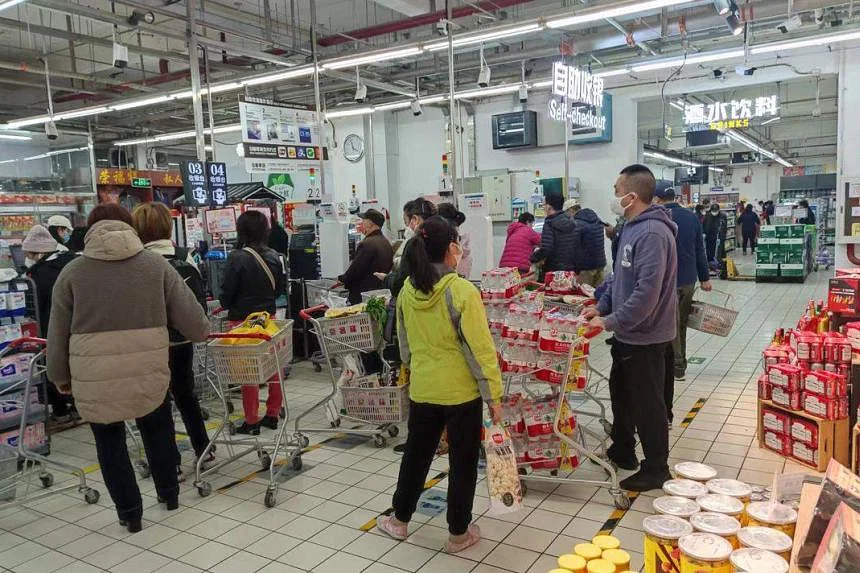November 24, 2022
BEIJING – Residents in the Chinese capital are hunkering down for what they expect will be an extended period of semi-lockdown, as infection numbers continue to surge and more people are confined to their homes.
Thousands of buildings and residential compounds have been sealed and schools, restaurants and gyms were ordered to close in the most extensive shutdown of the city since May, when similar measures were implemented.
Based on an official tally, there are now 1,294 high-risk areas across the 16 districts of the city of 21 million, up from about 800 at the beginning of this week.
Beijing on Wednesday reported 1,486 Covid-19 cases, of which 1,098 were asymptomatic. Of the total cases, 290 were picked up from required community screenings.
Nationwide, new daily cases have surpassed 28,000 and are on track to beat the record of over 29,000 cases set in April, prompting local governments from Chengdu, Chongqing to Shanghai to ramp up tried-and-tested measures such as mass testing and lockdowns.
The fierce spread of the virus across the country is putting immense pressure on the health authorities, who have only recently pivoted to a new targeted approach that is meant to be less disruptive to daily lives as the scope of those required to serve quarantine and the length of confinement were narrowed.
Health officials say the dominant strain circulating in the country now, the highly-transmissible Omicron variant BF.7 which has an incubation period of two days, is posing a severe challenge to their prevention work.
Last Friday, all kinds of establishments including bars, spas and gyms were told that they should shut for three days. Dine-in service was also banned in restaurants.
After what was supposed to be a weekend to “quieten down” the city, Beijing on Monday toughened restrictions, with officials urging people to work from home, while parks were also shut.
Office buildings imposed daily attendance quotas for tenants ranging from 5 to 30 per cent, while supermarkets and shops that were still open began to ask for a 24-hour or 48-hour negative Covid-19 test result for entry.
Usually busy streets in the hip Sanlitun area were empty on Wednesday afternoon, save for long queues at Covid-19 testing booths.
Badly-hit restaurant operators are resorting to discounts and promotions to boost their takeaway sales. Staff from hotpot chain Haidilao were seen pushing a trolley around, selling the restaurant’s famous soup base packets for 10 yuan (S$1.90) each to people waiting in line to get tested.
At popular supermarket chain Jingkelong in Xindong Road, patrons were filling their baskets with frozen food and staples such as rice and noodles in case of an extended lockdown. Some were also carting home cartons of bottled water.

Customers queue at the cashier line with frozen food and staples such as rice and noodles in their shopping carts in case of an extended lockdown. ST PHOTO: AW CHENG WEI
A retiree, who wanted to be known only as Madam He, said that her son had told her to stock up in case her residential compound is locked down.
“The delivery slots are all filled, so I came here to buy some noodles, frozen meat and other daily necessities like shampoo and toothpaste,” she said.

Residents stock up on necessities after Beijing officials urged people to work from home. ST PHOTO: AW CHENG WEI
Fruitseller Ji Hongbo, 24, said orders for deliveries have gone up by 30 per cent, while overall sales have increased by 50 per cent since last week.
“I’ve been so busy that I’ve been getting some orders wrong or overselling fruits. Sometimes, I end up making two trips to the same customer because I forget to pack it all at one go,” said Mr Ji, who opened his market stall at the beginning of this year.
“My brother, my wife and I can’t keep track of all the orders and deliveries. This is definitely the busiest we have been since we started working here.”
Some wearied Beijing residents have defied health officials’ call to stay home and refrain from gathering in groups. Stretches of the popular Liangma River have been busier than usual in the evenings since many people started working from home earlier this week.
“It’s more lively around the neighbourhood, especially in the late afternoon,” said Mr Eric Fang, 30, who moved to the area two months ago.
As infections continue to soar unabated, Beijing authorities have begun to convert buildings into “fangcang hospitals” – quarantine facilities for those with mild or no symptoms – to ease a bed crunch at local hospitals.
China faces a shortage of intensive care beds – a grim reality that may force it to delay a reopening that could extend past 2023.
Bloomberg Intelligence senior pharmaceutical analyst Sam Fazeli said a full reopening could potentially lead to 5.8 million people being admitted to intensive care. This would inundate China’s public health system, which now has fewer than four intensive care beds for every 100,000 patients.
Among the recently announced tweaks to its Covid-19 playbook were guidelines to increase hospital beds, improve vaccination rates and stockpile Covid-19 medication.

